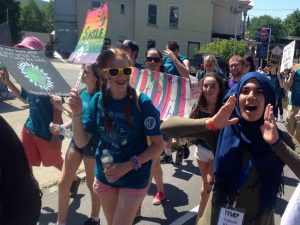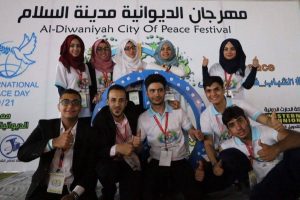-
What We Do
- WHERE WE WORK
-
About Us
 Welcome Message from Carol Jenkins
Welcome Message from Carol JenkinsFor more than 90 years, World Learning has equipped individuals and institutions to address the world’s most pressing problems. We believe that, working together with our partners, we can change this world for the better.
On my travels, I’ve had the opportunity to meet with many of those who have joined us in this mission. In Baghdad, we’ve trained more than 2,300 Iraqi youth who are already giving back at home. In London, our partners in the TAAP Initiative strongly believe that we are all responsible to practice inclusion. And in Vermont, our Experiment in International Living and School for International Training participants prove every day that they have the tools and the determination to change the world.
Please join us in our pursuit of a more peaceful and just world.
- Get Involved
Media Center > Story
How Fatima Khamasi Reimagined — Then Recreated — Her Community
July 25, 2018
Fatima Khamasi used to escape to her fantasies whenever life became especially difficult during Iraq’s struggle against ISIS. Troubled by the violence and prejudices that came with the sectarian war, Khamasi wanted to inspire peace in her small city of Diwaniyah. But she didn’t know where to start — and none of her friends believed peace was even possible. So, instead, she dreamed of flying away.
“When you are living in a war, what you imagine is just to escape from this war,” she says. “You don’t imagine the future, whether it’s going to be very colorful. You just imagine [the war is] going to be over.”
In 2016, Khamasi did fly away — albeit temporarily. At age 16, she was selected to join the Iraqi Young Leaders Exchange Program (IYLEP), a cultural exchange funded by the U.S. Embassy in Baghdad and the U.S. Department of State Bureau of Educational and Cultural Affairs. IYLEP has brought more than 2,300 Iraqi high school and undergraduate students over 10 years to the United States for four-week exchanges focusing on leadership, peacebuilding, and civic engagement.
 Khamasi was astonished to see how her host community, Ann Arbor, Michigan, embraced diversity. During a visit to the city’s Neutral Zone teen center, she saw people of all backgrounds working together to promote equality and human rights. “They’re different from each other and that doesn’t make a problem because difference is beauty,” she says. “You actually see peace everywhere.”
Khamasi was astonished to see how her host community, Ann Arbor, Michigan, embraced diversity. During a visit to the city’s Neutral Zone teen center, she saw people of all backgrounds working together to promote equality and human rights. “They’re different from each other and that doesn’t make a problem because difference is beauty,” she says. “You actually see peace everywhere.”
IYLEP left its strongest impression on Khamasi during a leadership workshop at World Learning’s headquarters in Brattleboro, Vermont, where a workshop leader challenged the group to use their imaginations in new ways. Rather than daydreaming about escape, Fatima discovered her imagination could provide a blueprint for transforming her community. “Imagination allows us to be what we want to be before it happens,” she says.
Khamasi returned to Diwaniyah with renewed determination. She reached out to the organizers of the Baghdad City of Peace Carnival — an annual youth-led festival held in the capital city — and asked for their blessing to start an offshoot of the festival in Diwaniyah. She believed such an event would be valuable for her “quiet” city, where she says people rarely come together or engage in civic life.
 Upon gaining the approval of the Baghdad festival organizers, Khamasi gathered her friends and fellow alumni from IYLEP and its virtual counterpart, the Digital Young Leaders Exchange Program (DYLEP). Together, they organized the Diwaniyah City of Peace Carnival, a one-night event with crafts, food, performances, children’s games, and a pervasive message of peace.
Upon gaining the approval of the Baghdad festival organizers, Khamasi gathered her friends and fellow alumni from IYLEP and its virtual counterpart, the Digital Young Leaders Exchange Program (DYLEP). Together, they organized the Diwaniyah City of Peace Carnival, a one-night event with crafts, food, performances, children’s games, and a pervasive message of peace.
Now in its third year, the festival is already making a difference. Khamasi recalls standing behind the outdoor stage last year watching attendees of all ages and from all quarters of the community gathered together, shining the flashlights on their mobile phones as a young pianist performed. “I cried that night,” she says. “I couldn’t believe it. To see people actually changing and to see them happy, to see smiles on their faces, even for a few hours.”
Khamasi, now 18, is headed to university, where she thinks she’ll study medicine and, eventually, international social work and community development. But she already knows what she’ll be doing in her spare time. “I want to work on projects to improve the community in my city, to break the traditions and all the barriers that people build around us,” she says. “I think we have big minds and we have to think bigger than the limits. We have to think out of the box.”





